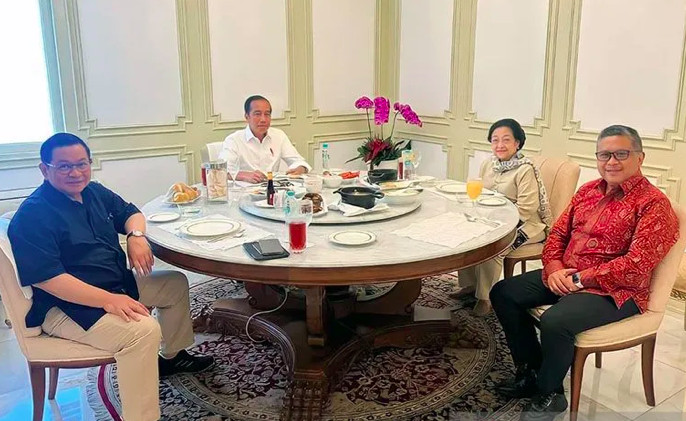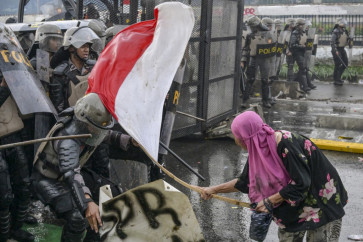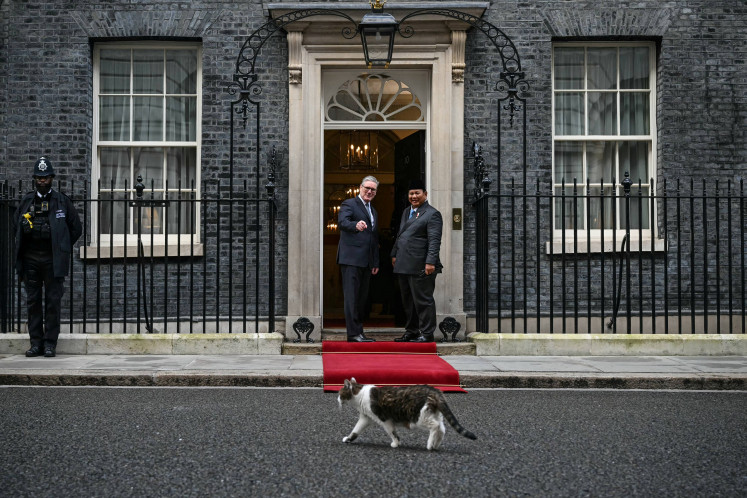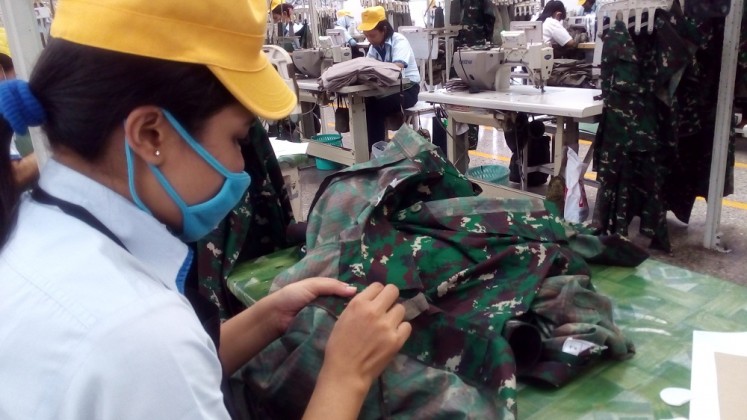Popular Reads
Top Results
Can't find what you're looking for?
View all search resultsPopular Reads
Top Results
Can't find what you're looking for?
View all search resultsCabinet reshuffle and a shift of Jokowi’s political stronghold
Jokowi's rival is no longer his long-time adversary, Prabowo Subianto, but rather his own political matron-turned-competitor, Megawati.
Change text size
Gift Premium Articles
to Anyone

The recent appointment of Budi Arie Setiadi as communications and information minister has divided the public. It is important to note that the controversy may have been sparked by Budi's political trajectory.
Budi, a loyalist of Jokowi and the founder of the largest pro-Jokowi volunteer group, Projo, has faced criticism due to his bold maneuvers to overshadow the Indonesian Democratic Party of Struggle (PDI-P), the president's party. He organized massive people gatherings known as Musyawarah Rakyat (People's Assembly), which took place in 30 provinces and primarily aimed to endorse specific candidates for elections. Regardless of the criticisms from the PDI-P executives, this is a relatively new "political innovation" that utilizes volunteers as a central driving force in proposing candidates and strengthening Jokowi's credentials as a power broker, if not kingmaker.
Therefore, what is even more significant than Budi's bravery is that he represents a completely independent stronghold that operates outside any formal and official political structure. The extensive and robust network of volunteers has no direct affiliation with the PDI-P, yet it operates as a quasi-political party. Jokowi's vast volunteer base has systematically promoted the President's agenda, consistently framed Indonesia's successful achievements under Jokowi's leadership, and most importantly, effectively utilized their numbers as a bargaining chip.
Conversely, the PDI-P has been grappling with an ongoing internal debate regarding the party's future leadership. The ruling party appears to have failed in maintaining its strong grip as it did in the 2014 and 2019 elections. Since announcing Ganjar Pranowo as the presidential hopeful, the PDI-P has struggled to address the potential rift that poses the greatest danger: how to provide Jokowi with ample space to pursue his own agenda without being coerced by the party's chairwoman, Megawati Soekarnoputri, who seeks to demonstrate her own political influence.
This ironic twist means that Jokowi's rival is no longer his long-time adversary, Prabowo Subianto, but rather his own political matron-turned-competitor, Megawati.
The appointment of Budi thereby can be seen as one of the safest ways for Jokowi to distance himself from the influence of the PDI-P and Megawati. Jokowi has openly rejected the option of selecting a minister from the PDI-P, which may indicate his desire to establish his own political legacy independently.

However, how do we assess the prospects of Jokowi's volunteer network in the current context? While it might be effective in previous elections, can it guarantee another success story and elevate Jokowi's status in the post-election period?
The most crucial fact to highlight is Jokowi's remarkably high approval rating, reaching an all-time high of 82 percent in July according to the Indonesia Survey Institute (LSI). This places him as the world's highest-rated leader, surpassing India's Narendra Modi. As a result, the question of which candidate President Jokowi will support carries significant weight, as his soaring approval rating can influence voters.
For some, the answer may already be apparent: the President, who is an active member of the PDI-P, should wholeheartedly support Ganjar, the Central Java governor. Ganjar not only hails from the PDI-P and is a selected member nominated as the presidential candidate, but he is also a prominent figure with a strong Javanese background and nationalist principles –attributes associated with Jokowi.
However, the clarity of Jokowi's support always appears elusive, if not intentionally obscured. Jokowi's broker-like stance extends beyond a defensive effort to safeguard his political legacy. It signifies a more significant competition among power brokers, as demonstrated by his courageous decision to withhold support for Ganjar.
On several occasions, Jokowi has shown a personal closeness to his defense minister Prabowo, The latest release from the LSI revealed a crucial fact: Jokowi's support for Prabowo has consistently bolstered the electability of the Gerindra Party chairman, surpassing Ganjar. Furthermore, Projo, along with other smaller volunteer groups supporting Jokowi, has declared their support for Prabowo instead of betting on Ganjar.
One absolute conclusion is that Jokowi's endorsement and unwavering supporters constitute a winning formula for the 2024 election. Meanwhile, Jokowi has expanded his dynastic network by involving his son, son-in-law and other family members in politics. This dynastic mindset enhances Jokowi's influence, presents a significant challenge to other oligarchs and keeps his political ambitions alive for the future.
Jokowi's support for Prabowo is evident through his children, particularly Gibran Rakabuming Raka, the mayor of Surakarta and his eldest son, and Kaesang Pangarep, his youngest son. Both have expressed their endorsements, with Gibran even attending a gathering of the Jokowi-Gibran Volunteers in Surakarta, Central Java, to support Prabowo's nomination. Most recently, however, Gibran expressed readiness to campaign for Ganjar after a meeting with PDI-P secretary-general Hasto Kristiyanto.
In a similar vein, Budi Arie recently signaled that the largest base of Jokowi's volunteers would vote for Prabowo. This can be seen as a threat to the PDI-P to some extent. The party, and ultimately Ganjar, would suffer from losing a significant portion of pro-Jokowi supporters. Furthermore, they would miss the opportunity to maintain Jokowi's aura within Ganjar's political performance.
The main issue at hand is not solely why Jokowi maintains a dual stance that undermines his own party. What is more pressing is how long the PDI-P and Megawati can withstand the tension against Jokowi and his impressive modalities, including the loyalty of his volunteers.
The answer to this question lies in the future. The pressure is undoubtedly on the ruling party, as it must decide whether to readjust the arrangement and offer Jokowi concessions, or confidently adhere to its decision and attempt to recreate "another Jokowi" through Ganjar, as it did in 2014.
***
The writer is a political researcher, with a PhD from the University of Leeds, the United Kingdom.










